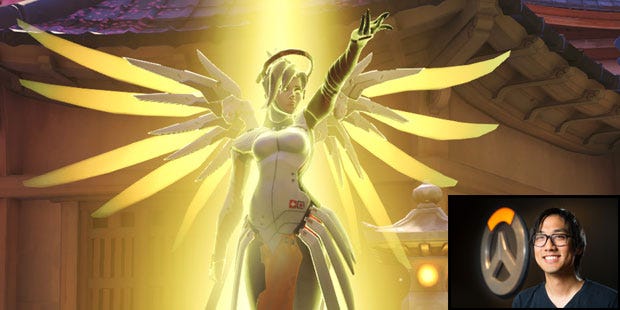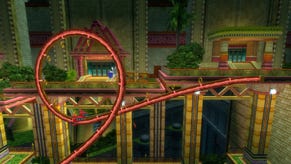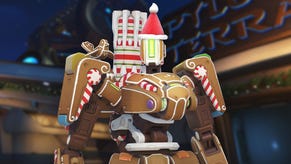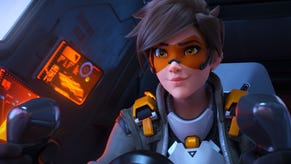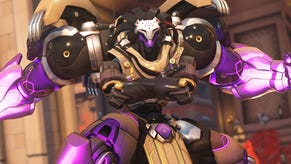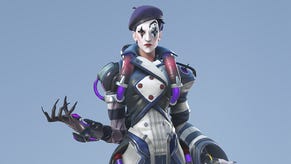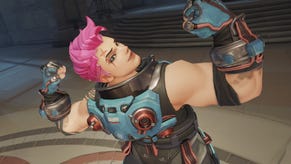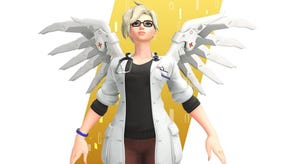Overwatch's Michael Chu On Lore And Storytelling
Making the lore
With Blizzard's first-person shooter, Overwatch's [official site] launch a few hours away, senior game designer, Michael Chu, has come to London as part of the game's global release activities. I assume it's been a very similar experience for him to playing the game's UK map, King's Row, although he tells me there have been "fewer hover-buses". I was about to explain about the joys of "driving" the Docklands Light Railway but thought I should probably ask Overwatch-related questions instead. Maybe he will drive the DLR tomorrow.
Pip: Hi Michael, can you tell me a bit about your job and what it involves on a day-to-day basis?
Michael Chu: I'm a senior game designer on Overwatch. Primarily what I work on is the lore, storytelling and writing for Overwatch. That means I do stuff like I write all the dialogue for the characters, I oversee the VL recording for the characters, I work on developing the backstory, I work with the game team to add story and establish the locations for the maps and I work with them on arting them out and figuring out what goes on the signs, stuff like that. The other big thing that I do is I work with some of the other groups at the company to create the fiction we've been releasing outside the game. That's stuff like that graphic novel, the comics and the animated shorts.
Was the game's long beta period useful for you?
MC: In general, the great thing about the beta we've had is that it enabled us to get a lot of feedback from the players. Obviously with a game as complex as this, with twenty-one heroes, it's been really great to get a lot of feedback from the beta testers and one of the really interesting things is being able to quickly make changes to the game and then see how players react to it. Also we've been able to gather a lot of data just on wins and losses and how people are performing in the game, so really the best thing it's enabled us to do is test out the game and get it ready for release.
Did any of the information that came out of the beta come as a surprise?
MC: I can't think of anything particular. But I will say it's been really interesting just to see the evolution of the characters and the balance. Specific system design isn't really my thing so I really love the process of watching our system designers like Geoff Goodman and Scott Mercer and Mike Heiberg as they take all of this feedback into account and how they decide to approach the problems.
They tend not to just do little tweaks here and there. What they do is they're really good at identifying the problem that the data and the feedback says and try to come up with interesting solutions that still keep everyone fun to play and people aren't getting hit with the nerf bat too hard. It's a really interesting process to see.
One thing I do remember personally from the beta that was really gratifying was - I'm not sure at what point it was, I think at some point in the closed beta – we added voice interactions between characters. Before the match some of the characters will talk to each other and it was audio we had recorded for some time, we just hadn't gotten around to hooking it up. We put it in and everyone was like 'Oh wow, this is so cool! I never had any idea and now I'm learning more about the story of the game'. I think that was a really fun thing that happened in beta for me personally.
I don't know if this sounds right to you but it feels to me like there's a metagame between you and the players in terms of seeding and uncovering touches around the world – Easter eggs and story hints – maybe a poster with particular references to other characters and so on. It's not a collaboration but more of a cat-and-mouse game?
MC: I think it's definitely been something we've been doing intentionally. I've found it to be really interesting. I hope that the community has also felt the same way and they don't feel like we're just constantly teasing them and forcing them to put things together themselves! I think the origin of the idea was we knew that we weren't going to have a traditional, linear narrative in the game because we wanted to focus on the multiplayer aspect of it, the competitive shooter. It really became clear we would have to find another way to get the story across.
We thought it might be interesting - and in some ways this is a bit of a variation on how we've developed stories in the past – if we provided more context and threw some ideas out there and put some hints of things and we didn't specifically do a big lore document for some of these things to explain the characters. It's something that's been really interesting because it's afforded us space to build the universe as we go. I know that sounds like we have no idea where we're going and what we're doing and we're just making it up - and to an extent that's true! But it leaves us space to create connections between the characters and develop a plot as we find out more about it.
One of the good examples of this is we started with twelve characters at Blizzcon and now we're up to twenty-one. As we added in those nine characters and all the new maps our idea of the world as a concrete place has grown and because of that we've been able to solidify some of the story ideas we've been thinking about.
Are there any hidden references that the community hasn't uncovered yet? Or is it more that you're having to be more devious or subtle in burying them to stop them being found instantly?
MC: One thing I would note, which is not exactly what you're asking but I will answer that, is we wanted to play with the idea of perspective. So one thing it's important to think about when looking at the Overwatch universe is that you shouldn't necessarily believe everything a character says or everything that's written about the character because we very much intend for it to be viewed through the eyes of the person who is offering that opinion. But as far as references, there are definitely references that people haven't found yet.
Perspective was mentioned in relation to the Soldier: 76 biography. So much is listed as mysterious and unknown from the perspective of his official site bio, but when you look elsewhere there's far more flavour to be found.
MC: When we had started writing those backstory things, originally we intended them to be at that game manual point of view. But, as I think about it more, I feel like they are actually intended to be from a certain perspective, so [they represent] the commonly held information or something like that.
But then the Soldier: 76 thing is actually a really good example because what we wanted to do was give a lot of different perspectives about this character before we revealed him so you got the news articles and the news broadcasts about him, you got the backstory blurb on his character page which is very much like you were saying "unknown, unknown, unknown". But then we also did the animated piece - the drawn animated piece - which is narrated by him, so in that instance you are able to go inside his head and see what he was thinking. I think what's really interesting is now, a year later, maybe longer than that, we released the hero video which gives you another perspective that isn't necessarily in Soldier: 76's head but you see it through the perspective of the little girl.
Before I ask about that animation is there anything you can tell me about Sombra [the rumoured upcoming character based on a bunch of in-game clues put together by fans] – even whether she exists or not?
MC: [suddenly coy] I think I've heard rumours of someone or something with that name.
Okay, well going back to Soldier: 76 - in that short there's a lot of violence but there's almost a Batman approach, not showing him actually killing people but there's no getting away from the fact that's he's a hero with a gun. He's the most obvious traditional shooter character in there so I wanted to talk about the tension of having a character like that but needing to make the short fit the cartoony, upbeat side of the universe? Are Soldier: 76 or similar characters a difficult thing to work with in that environment?
MC: The Overwatch universe is intended to be this optimistic, bright, vibrant universe where heroes are off doing heroic things and I think that Soldier: 76 at times is a complicated character in that respect. I would say in general that our perspective on the violence is that it's not - we don't want to really have the story be all about that. We want the story to more be more about the conflict and we don't want to dwell too much on it. But I think with a character like Soldier: 76 obviously that is - he's a vigilante so it's obviously a big part of his character.
In terms of the almost superhero-ish nature of the universe, can you tell me about the influences you've tapped into? For example, I get a lot of Mad Max from Roadhog.
MC: It's interesting you mention that because I think that Overwatch owes a huge debt to superheroes and comics. I remember some of my earliest memories working at Blizzard would be sitting with Chris Metzen, our creative director, in his office and we'd be talking about what was going on in Green Lantern and Spider-Man at the time, so we have a tremendous love for that medium and those stories and those characters. We definitely took inspiration from that.
But mentioning the Mad Max inspiration, Overwatch, in addition to being this heroic universe, it is also a futuristic science-fictional universe and I think we've taken a lot of inspiration in that direction also, which you can see in characters like Roadhog and Junkrat. They're not exactly your common superheroes. They're sort of something else - well, those two are definitely something else. We really tried to draw inspiration from a lot of different places.
When I was first reading the character biographies I wondered if you had ever considered doing something like in Counter-Strike where you have Terrorists vs Counter-Terrorists. Maybe having Overwatch vs Talon?
MC: In terms of the gameplay?
Yes - maybe having some heroes associated with one side and the others on the other – only picking from your faction in relation to the objective?
MC: If you look at a game like World Of Warcraft, the Horde/Alliance split is such a big deal and such a defining aspect of the game. But Overwatch, pretty much from the start, we didn't want to restrict ourselves that way. Because the game is so much about having the flexibility to play all these heroes and finding all the ways they play well together or against each other. Because of that we decided that the gameplay of the Overwatch universe wouldn't be bound by that.
Our story justification - what I usually tell people - is that I think of it as, it's clearly not canonical, but I think of it as how in comic book stories sometimes Iron Man and Captain America fight each other. Maybe in this instance on this map they're fighting - for some reason they have some ideological difference or something that's bringing them against each other.
But I think ultimately it was important for the game that you were able to play whatever characters you want. Blizzard has this development philosophy which is 'Gameplay first' and this is definitely an example of where we've gone with that.
When I was playing during the beta, whenever there was a new influx of people and a new wave of invites had gone out, I'd see people try to main a character for a whole game then get to grips with the swapping system. Can you tell me a bit about your role and the role of lore in getting them to try new things or form new favourites?
MC: It's funny because I expected you to say with every new influx of players, Bastion murders...
I can't even deal with that.
MC: [laughs] What I'll say about the influence of lore is that yeah, I absolutely hope that people will watch an animated short or read a comic and maybe that insight into the character is enough to convince them to try out a character that maybe they hadn't been interested in in the past.
Maybe it's just enough to inspire them. I hope these external fictional expressions of the game do that. Also I hope they bring more information and make people more excited about the characters they already like playing.
Some of the bios are quite long and involved. How do you strike a balance between explaining the backstory as you see it but still leave space for players to project onto characters?
MC: We definitely have a value on the storytelling to simplify. It's something we always look at I would say these characters are significantly more complicated before what we ultimately release and create them to be.
That said, as you mention, I remember there is a variance on how complex their backstories are. Reaper's, if I remember correctly, is quite short, and someone like Genji's is much longer. We don't try to overdo it. We try to get the core things that made the character who they are and maybe the core conflict which they continue to be involved in.
With the example of some of the ones who are more complicated like Genji, maybe selfishly we just had a lot of story ideas and stuff we wanted people to know about him and so it ended up being a little bit longer than the other ones. But I would say in general that we try to keep things simple and we want there to be mysteries and we want there to be spaces in those characters for people to theorise about.
Even with that Genji example, where the story is a bit longer and there are more details, I think there's a lot of room there for us to explore, like what the childhood relationship between Hanzo, Genji and their father was, and what was Genji like as an Overwatch agent. I think there's still a lot of space there.
In terms of your own affinity for characters, do you have a favourite?
MC: I really love all of them. We made an effort to have these characters feel as though they could be starring in their own game. So because that they all have different kinds of stories. Sometimes what I find is it's more like what are you in the mood for? Certain characters and their stories will be interesting at different times.
That said, it may be kind of obvious but I do like the story of Hanzo and Genji. They're two characters with a very interlinked past and that sort of thing is very interesting to explore. I also think his character has gone through so much growth from where he started as a ninja Yakuza in training and then an Overwatch agent and eventually becomes a cyborg. I think the idea of him coming to grips with his life changing so much is an interesting story.
The official Twitter account has mentioned new characters after launch but the current roster feels quite tight. This might be more of a question for the mechanical design side of the team but how do you look at the character lineup and see gaps?
MC: I think it's very similar to the process we went through coming up with the original twenty-one character cast. At certain points in the development it does feel like we have a pretty solid cast of characters, we feel like a lot of the gaps are filled. But the way we come up with new characters, it can come from a lot of different places.
Sometimes it's one of the hero designers will come up with a specific power or a weapon or style of gameplay they'd like to introduce into the game and they'll run with it. Sometimes the concept artist will draw a character. Arnold Tsang, our assistant art director will just draw this character and we'll be like, 'Yup! We'll figure out a way to get this in there'.
I think going forward it's the same thing - what excites us? It could be art, it could be story, it could be mechanical. But I feel pretty confident there's still some space there to fill out the roster a bit.
Finally, how do you see Overwatch developing? With WoW for a new player it's a very different prospect now than it was 10 years ago. Do you see Overwatch changing over time, maybe the maps developing and the game being a very different thing in ten years time if it lasts that long, or is it more of a static shooter like, say, Counter-Strike, where de_dust2 [is this iconic familiar persistant thing]?
MC: Wow, that's uh... It's hard for me to look that far in the future. One thing I can maybe talk about is that one of our desires with the story and world of Overwatch is that this is very much a starting point. We have history that we've talked about and the story is at this point where the world is in crisis and Overwatch isn't there. Winston's had this idea that maybe he'd like to bring it back. I think that it's a story we want to continue to develop and push forward so my hope is that that story will continue to develop, but as far as the game goes that's hard for me to say so far in the future. I would love to see more heroes and more maps.
Thank you for your time.
Overwatch is out today. Find out when in your region.
If you want some help with how the heroes play, check out our Overwatch character guide.
